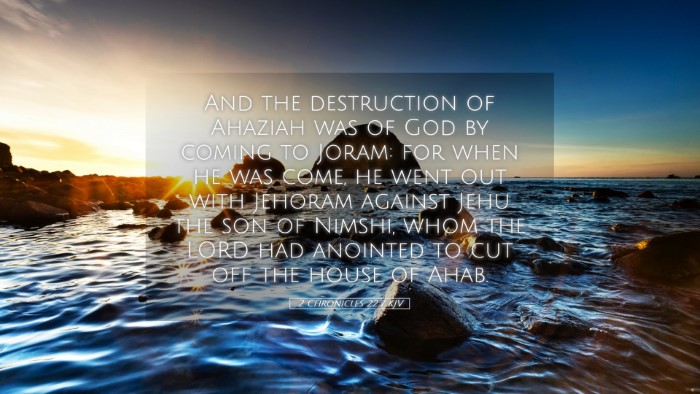Commentary on 2 Chronicles 22:7
2 Chronicles 22:7 states: "And the destruction of Ahaziah was of God by coming to Joram; for when he was come, he went out with Jehoram against Jehu the son of Nimshi, which the Lord had anointed to cut off the house of Ahab."
Introduction
This verse highlights a significant moment in the history of Judah and Israel, as well as divine sovereignty over the affairs of nations. The actions and decisions of Ahaziah, the king of Judah, are deeply intertwined with God's judgment against the house of Ahab. The insights from public domain commentaries will be analyzed, presenting a holistic view suitable for pastors, students, theologians, and Bible scholars.
The Context of 2 Chronicles 22
The backdrop of 2 Chronicles 22 is critical for understanding this verse. The chapter begins with the introduction of Ahaziah as a leader who aligns himself with the sinful lineage of Ahab. Ahaziah's reign is characterized by a lack of adherence to God's ways, which sets the stage for the events that unfold. The alliance with Joram (Jehoram) illustrates the consequences of associating with ungodly influences.
Divine Sovereignty and Human Action
The phrase "And the destruction of Ahaziah was of God" indicates a divine orchestration behind human actions. This understanding stems from the insights of Matthew Henry, who emphasizes that calamities and judgments highlight God’s active role in human history. This clash between divine will and human agency is present in the narrative.
Commentary Insights
- Matthew Henry: He focuses on the providence of God and indicates that God's purposes will prevail despite human decisions. Henry notes the judgment that unfolds because Ahaziah sought to support Joram, indicating that his downfall was a direct result of his misalignment with God's will.
- Albert Barnes: Barnes elaborates on the significance of Ahaziah's choice to ally with Joram, asserting that this was a deliberate step away from God's guidance. He views the destruction of Ahaziah as a part of God's plan to eradicate the house of Ahab, thus illustrating God’s judgment against sin.
- Adam Clarke: Clarke stresses that this event demonstrates God's control over the affairs of men. He elaborates on how Ahaziah’s fate was intertwined with the divine judgment that was being executed through Jehu, underscoring the inevitability of divine justice.
Christological Implications
Through a Christ-centered lens, this verse points to the greater redemptive narrative. The judgment meted out on Ahaziah prefigures the ultimate justice found in Christ, who confronts the powers of darkness. Ahaziah’s destruction due to his sinful alliances resonates with the theme of seeking allegiance with God rather than the world, a constant exhortation found throughout biblical scripture.
Theological Reflections
This passage invites serious theological reflection on the significance of divine judgment and human relationships. The alliances we form can lead us toward or away from God's purposes:
- Divine Judgment: Ahaziah represents the futility of defying God. The text asks readers to consider the long-term consequences of disobedience.
- God's Sovereignty: Even in the face of human rebellion, God’s sovereign will prevails. This theme is crucial for understanding the nature of God's governance in a world filled with chaos.
- Warning Against Compromise: The narrative serves as a caution against forming alliances with those who do not follow God, echoing the importance of being equally yoked with believers.
Conclusion
In conclusion, 2 Chronicles 22:7 presents a vital reflection on God's sovereignty, judgment, and the implications of our alliances. The insights from Matthew Henry, Albert Barnes, and Adam Clarke provide a rich tapestry of understanding that encourages us to recognize the seriousness of choices in light of divine purpose. As we study this verse, may it remind us of the divine workings in our lives and the importance of aligning ourselves with God's will rather than with the transient allegiances of this world.


